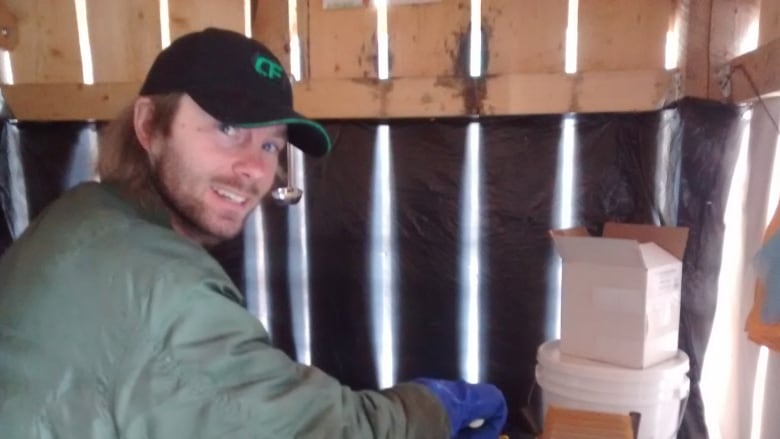Sweet spot: Yukon family taps into birch syrup niche
Sugaring season is in full swing in central Yukon

Sugaring season is in full swing on a southern-facing bluff overlooking the McQuesten River in central Yukon. That's where Lyndsay Berwyn and his family operate a renowned birch syrup operation.
Sugaring season came three weeks earlier than it ever has, in the 12 years that the birch forest has been tapped for sap.
Berwyn has a big operation — about 1,500 trees are tapped each spring — but he's got making birch syrup down to an art.
His syrup has won awards, and ends up on plates across Yukon, and all over the world.
"We supply breweries in Denmark so they can make a birch beer. We sell to Russia, Saudi Arabia, Japan," he said.
Berwyn says there are only about two dozen birch syrup operations like theirs, in the world. That's because it's a lot of work, and birch syrup is trickier to make than maple syrup.
16 to 18 hour days
The shack is where Lyndsay Berwyn lives, this time of year. If it were a beer-making operation, he'd be the brewmaster.
He stays in the sugar shack this time of year because he's the only one who knows how to run the evaporator. He processes sap for 16 to 18 hours a day.
"So, I just have a tent set up in the second floor of the sugar shack and I just crash there for a few hours when I can," he said.
The evaporator is a machine that looks like it belongs in Willy Wonka's chocolate factory. It consists of a series of stainless steel panels over a 4 metre-long wood-burning furnace.
Berwyn fills the furnace every 20 minutes. It's got to be blazing to keep the sap at the right temperature.

On average, 5,000 to 7,000 litres of sap are boiled into sugar every day, over the 20-day sugaring season. At any given time, there will be a couple hundred litres of concentrate boiling in the evaporator.
"It's kind of fun when it's up and running and rumbling along," Berwyn said.
Living off the land
Berwyn lives on the property year-round with his partner, Sylvia Frisch, and their two young daughters, and they try to live off the land.
They used proceeds from the birch syrup to buy a small mill, and two goats. Trees were milled, and turned into a small barn, a shop, outhouses, and a cabin.
It took a while to get to where they are now. Frisch remembers when they lived in a small wall tent, and tapped only 500 trees in a season.
Now, they have their land on an agriculture lease that's tied to a forestry permit. The permit's for the birch trees, but, "rather than cut them down, we just tap them," Frisch said.
To Berwyn, it's the only way he knows how to live, and to raise his daughters.
"I could never imagine myself sitting at a desk in the office, or even just living in town," he said.